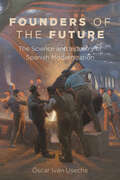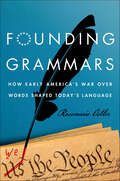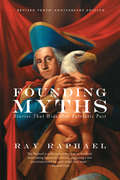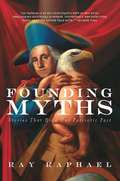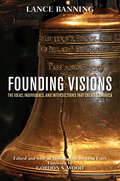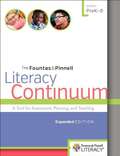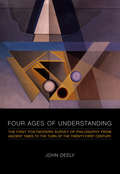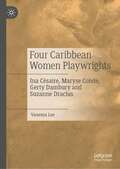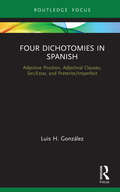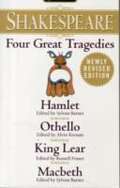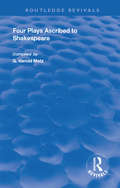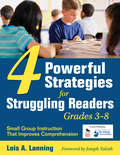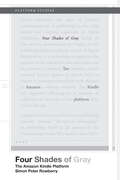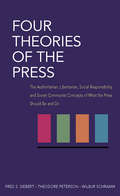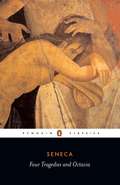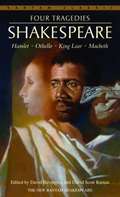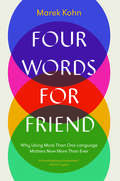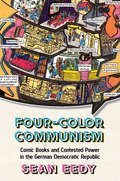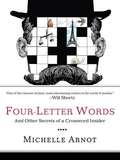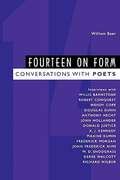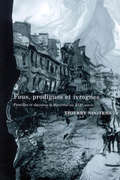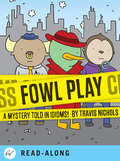- Table View
- List View
Founders of the Future: The Science and Industry of Spanish Modernization (Campos Ibéricos: Bucknell Studies in Iberian Literatures and Cultures)
by Óscar Iván UsecheIn this ambitious new interdisciplinary study, Useche proposes the metaphor of the social foundry to parse how industrialization informed and shaped cultural and national discourses in late nineteenth- and early twentieth-century Spain. Across a variety of texts, Spanish writers, scientists, educators, and politicians appropriated the new economies of industrial production—particularly its emphasis on the human capacity to transform reality through energy and work—to produce new conceptual frameworks that changed their vision of the future. These influences soon appeared in plans to enhance the nation’s productivity, justify systems of class stratification and labor exploitation, or suggest state organizational improvements. This fresh look at canonical writers such as Emilia Pardo Bazán, Concha Espina, Benito Pérez Galdós, Vicente Blasco Ibáñez, and José Echegaray as well as lesser known authors offers close readings of their work as it reflected the complexity of Spain’s process of modernization.
Founding Grammars: How Early America's War Over Words Shaped Today's Language
by Rosemarie OstlerA “lively and revealing” history of America’s obsession with grammar—from the debate over double negatives to the influence of frontier vernacular (Kirkus Reviews).Standard grammar and accurate spelling are widely considered hallmarks of a good education, but their exact definitions are much more contentious—capable of inciting a full-blown grammar war at the splice of a comma. With an accessible and enthusiastic approach, Ostler considers these grammatical shibboleths, tracing current debates back to America’s earliest days, an era when most families owned only two books—the Bible and a grammar primer.Along the way, she investigates colorful historical characters on both sides of the grammar debate in her efforts to unmask the origins of contemporary speech. Linguistic founding fathers like Noah Webster, Tory expatriate Lindley Murray, and post-Civil War literary critic Richard Grant White, all play a featured role in creating the rules we’ve come to use, and occasionally discard, throughout the years. Founding Grammars is for curious readers who want to know where grammar rules have come from, where they’ve been, and where they might go next.
Founding Myths
by Ray RaphaelFirst published ten years ago, award-winning historian Ray Raphael's Founding Myths has since established itself as a landmark of historical myth-busting. With the author's trademark wit and flair, Founding Myths exposes the errors and inventions in America's most cherished tales, from Paul Revere's famous ride to Patrick Henry's "Liberty or Death" speech. For the seventy thousand readers who have been captivated by Raphael's eye-opening accounts, history has never been the same.In this revised tenth-anniversary edition, Raphael revisits the original myths and explores their further evolution over the past decade, uncovering new stories and peeling back additional layers of misinformation. This new edition also examines the highly politicized debates over America's past, as well as how school textbooks and popular histories often reinforce rather than correct historical mistakes.A book that "explores the truth behind the stories of the making of our nation" (National Public Radio), this revised edition of Founding Myths will be a welcome resource for anyone seeking to separate historical fact from fiction.
Founding Myths: Stories That Hide Our Patriotic Past
by Ray RaphaelWith wit and flair, Founding Myths exposes the errors and inventions in thirteen of America's most cherished tales, from Paul Revere's famous ride to Patrick Henry's "Liberty or Death" speech. Exploring the dynamic intersection between history-making and story-making, award-winning author and historian Ray Raphael shows how these fictions--conceived in the narrowly nationalistic politics of the nineteenth century--undermine our democratic ideals.
Founding Visions: The Ideas, Individuals, and Intersections that Created America
by Lance Banning“Banning’s skill as an essayist shines” in this collection of writing on the foundation of the American republic (San Francisco Book Review).Lance Banning was assembling this collection of his best and most representative writings on the Founding era when his untimely death stalled the project just short of its completion. Now, thanks to the efforts of editor Todd Estes, this illuminating resource is finally available. Founding Visions showcases the work of a historian who shaped the intellectual debates of his time. Featuring a foreword by Gordon S. Wood, the volume presents Banning’s most seminal and insightful essays to a new generation of students, scholars, and general readers.“Lance Banning’s balanced but penetrating view of historical materials makes him a vital mediator in scholarly disputes, one who knows how to bring light rather than heat to controversies better understood as joint contributions. . . . Every historian, whether beginning or advanced, will benefit from reading this book.” —Robert A. Ferguson, Columbia University, author of Reading the Early Republic“Banning’s impeccable scholarship has shaped the way we think about early American history, and the essays in this volume show him at the peak of his very considerable powers.” —Peter S. Onuf, Robert H. Smith International Center for Jefferson Studies, author of The Origins of the Federal Republic: Jurisdictional Controversies in the United States, 1775-1787“Exemplary.” —Journal of Southern History“The work represents an impressive collection that is an essential companion to any serious student of the intellectual issues of the early Republic.” —Southern Historian
Fountas and Pinnell Literacy Continuum
by Irene Fountas Gay PinnellThere has never been a more comprehensive resource available to teachers that does what the continuum does - provide specific behaviors and understandings that are required at each level for students to demonstrate thinking within, beyond, and about the text. These behaviors and understandings describe what students will be expected to do in order to effectively read and understand the text. <p><p> More in-depth, more intuitive, and more essential than ever-The Fountas & Pinnell Literacy Continuum, Expanded Edition enables teachers to construct a common vision for student achievement that effectively and efficiently engages all students in the robust, authentic and meaningful literacy learning every child deserves. The Literacy Continuum provides a way to look for specific evidence of learning from prekindergarten through grade eight, and across eight instructional contexts. Each instructional context contributes substantially, in different but complementary ways, to students' development of the literacy process. With this indispensable literacy tool, Fountas and Pinnell remind you of The Literacy Continuum's critical role in transforming literacy teaching and learning.
Four Ages of Understanding: The First Postmodern Survey of Philosophy from Ancient Times to the Turn of the Twenty-First Century (Toronto Studies in Semiotics and Communication)
by John DeelyThis book redraws the intellectual map and sets the agenda in philosophy for the next fifty or so years. By making the theory of signs the dominant theme in Four Ages of Understanding, John Deely has produced a history of philosophy that is innovative, original, and complete. The first full-scale demonstration of the centrality of the theory of signs to the history of philosophy, Four Ages of Understanding provides a new vantage point from which to review and reinterpret the development of intellectual culture at the threshold of "globalization". Deely examines the whole movement of past developments in the history of philosophy in relation to the emergence of contemporary semiotics as the defining moment of Postmodernism. Beginning traditionally with the Pre-Socratic thinkers of early Greece, Deely gives an account of the development of the notion of signs and of the general philosophical problems and themes which give that notion a context through four ages: Ancient philosophy, covering initial Greek thought; the Latin age, philosophy in European civilization from Augustine in the 4th century to Poinsot in the 17th; the Modern period, beginning with Descartes and Locke; and the Postmodern period, beginning with Charles Sanders Peirce and continuing to the present. Reading the complete history of philosophy in light of the theory of the sign allows Deely to address the work of thinkers never before included in a general history, and in particular to overcome the gap between Ockham and Descartes which has characterized the standard treatments heretofore. One of the essential features of the book is the way in which it shows how the theme of signs opens a perspective for seeing the Latin Age from its beginning with Augustine to the work of Poinsot as an indigenous development and organic unity under which all the standard themes of ontology and epistemology find a new resolution and place. A magisterial general history of philosophy, Deely's book provides both a strong background to semiotics and a theoretical unity between philosophy's history and its immediate future. With Four Ages of Understanding Deely sets a new agenda for philosophy as a discipline entering the 21st century.
Four Caribbean Women Playwrights: Ina Césaire, Maryse Condé, Gerty Dambury and Suzanne Dracius
by Vanessa LeeFour Caribbean Women Playwrights aims to expand Caribbean and postcolonial studies beyond fiction and poetry by bringing to the fore innovative women playwrights from the French Caribbean: Ina Césaire, Maryse Condé, Gerty Dambury, Suzanne Dracius. Focussing on the significance of these women writers to the French and French Caribbean cultural scenes, the author illustrates how their work participates in global trends within postcolonial theatre. The playwrights discussed here all address socio-political issues, gender stereotypes, and the traumatic slave and colonial pasts of the Caribbean people. Investigating a range of plays from the 1980s to the early 2010s, including some works that have not yet featured in academic studies of Caribbean theatre, and applying theories of postcolonial theatre and local Caribbean theatre criticism, Four Caribbean Women Playwrights should appeal to scholars and students in the Humanities, and to all those interested in the postcolonial, the Caribbean, and contemporary theatre.
Four Dichotomies in Spanish: Adjective Position, Adjectival Clauses, Ser/Estar, and Preterite/Imperfect
by Luis H. GonzálezExamining four dichotomies in Spanish, this book shows how to reduce the six to ten rules common in textbooks for each contrast to a single binary distinction. That distinction is a form of totality vs. part, easier to see in some of the dichotomies, but present in all of them. Every chapter is example-driven, and many of those examples come from writing by students. Readers can test out for themselves the explanation at work in the examples provided. Then, those examples are explained step by step. In addition to examples from writing by college students, there are examples from RAE (Real Academia Española), from scholars, from writers, from Corpes XXI (RAE), from the Centro Virtual Cervantes, and from the Internet. Many of those examples are presented to the reader as exercises, and answers are provided. This book was written for teachers of Spanish as a second language (L2) and for minors or majors of Spanish as an L2. It will also benefit teachers and learners of other L2s with some of these dichotomies.
Four Dubliners: Wilde, Yeats, Joyce, and Beckett
by Richard EllmannBiographies, histories, and literary criticisms of the 4 Irish authors.
Four Great Tragedies: Hamlet, Macbeth, King Lear,Othello
by William Shakespeare Sylvan BarnetThe greatest works of tragedy from the Bard, this book features Hamlet, Othello, King Lear and Macbeth.
Four Plays Ascribed to Shakespeare: An Annotated Bibliography (Routledge Revivals)
by G. Harold MetzFirst published in 1982, this volume responds to the attribution of numerous plays to Shakespeare which were not his own and selects four plays which have been ascribed in whole or in part to Shakespeare by responsible, talented scholars: The Reign of King Edward III, Sir Thomas More, The History of Cardenio and The Two Noble Kinsmen. Included in the bibliography are all the books, chapters and appendices of books, articles, review articles, reviews and notices of stage productions and a limited number of the more substantial discussions dealing with the four plays and published since 1930. The bibliography is organized by play with an initial section listing items dealing with two or more plays.
Four Powerful Strategies for Struggling Readers, Grades 3-8: Small Group Instruction That Improves Comprehension
by Lois A. LanningHelp struggling readers succeed by teaching four research-based comprehension strategies with sample lessons and a gradual-release approach leading to student-directed learning.
Four Shades of Gray: The Amazon Kindle Platform (Platform Studies)
by Simon Peter RowberryThis first book-length analysis of Amazon&’s Kindle explores the platform&’s technological, bibliographical, and social impact on publishing.Four Shades of Gray offers the first book-length analysis of Amazon&’s Kindle and its impact on publishing. Simon Peter Rowberry recounts how Amazon built the infrastructure for a new generation of digital publications, then considers the consequences of having a single company control the direction of the publishing industry. Exploring the platform from the perspectives of technology, texts, and uses, he shows how the Kindle challenges traditional notions of platforms as discrete entities. He argues that Amazon&’s influence extends beyond &“disruptive technology&” to embed itself in all aspects of the publishing trade; yet despite industry pushback, he says, the Kindle has had a positive influence on publishing. Rowberry documents the first decade of the Kindle with case studies of Kindle Popular Highlights, an account of the digitization of books published after 1922, and a discussion of how Amazon&’s patent filings reflect a shift in priorities. Rowberry argues that while it was initially convenient for the book trade to outsource ebook development to Amazon, doing so has had adverse consequences for publishers in the mid- and long term, limiting opportunities for developing an inclusive and forward-thinking digital platform. While it has forced publishers to embrace digital forms, the Kindle has also empowered some previously marginalized readerships. Although it is still too early to judge the long-term impact of ebooks compared with that of the older technologies of clay tablets, the printing press, and offset printing, the shockwaves of the Kindle continue to shape publishing.
Four Shakespearean Period Pieces
by Margreta de GraziaIn the study of Shakespeare since the eighteenth century, four key concepts have served to situate Shakespeare in history: chronology, periodization, secularization, and anachronism. Yet recent theoretical work has called for their reappraisal. Anachronisms, previously condemned as errors in the order of time, are being hailed as alternatives to that order. Conversely chronology and periods, its mainstays, are now charged with having distorted the past they have been entrusted to represent, and secularization, once considered the driving force of the modern era, no longer holds sway over the past or the present. In light of this reappraisal, can Shakespeare studies continue unshaken? This is the question Four Shakespearean Period Pieces takes up, devoting a chapter to each term: on the rise of anachronism, the chronologizing of the canon, the staging of plays “in period,” and the use of Shakespeare in modernity’s secularizing project. To read these chapters is to come away newly alert to how these fraught concepts have served to regulate the canon’s afterlife. Margreta de Grazia does not entirely abandon them but deftly works around and against them to offer fresh insights on the reading, editing, and staging of the author at the heart of our literary canon.
Four Theories of the Press: The Authoritarian, Libertarian, Social Responsibility, and Soviet Communist Concepts of What the Press Should Be and Do (Essay Index Reprint Ser.)
by Fred Siebert Theodore Peterson Wilbur SchrammPresented here are four major theories behind the functioning of the world's presses: (1) the Authoritarian theory, which developed in the late Renaissance and was based on the idea that truth is the product of a few wise men; (2) the Libertarian theory, which arose from the works of men like Milton, Locke, Mill, and Jefferson and avowed that the search for truth is one of man's natural rights; (3) the Social Responsibility theory of the modern day: equal radio and television time for political candidates, the obligations of the newspaper in a one-paper town, etc.; (4) the Soviet Communist theory, an expanded and more positive version of the old Authoritarian theory.
Four Tragedies and Octavia
by SenecaBased on the legends used in Greek drama, Seneca's plays are notable for the exuberant ruthlessness with which disastrous events are foretold and then pursued to their tragic and often bloodthirsty ends. Thyestes depicts the menace of an ancestral curse hanging over two feuding brothers, while Phaedra portrays a woman tormented by fatal passion for her stepson. In The Trojan Women, the widowed Hecuba and Andromache await their fates at the hands of the conquering Greeks, and Oedipus follows the downfall of the royal House of Thebes. Octavia is a grim commentary on Nero's tyrannical rule and the execution of his wife, with Seneca himself appearing as an ineffective counsellor attempting to curb the atrocities of the emperor.
Four Tragedies: Hamlet, Othello, King Lear, Macbeth
by William Shakespeare David Bevington David Scott KastanThe greatest works of tragedy from the Bard, this book features "Hamlet," "Othello," "King Lear" and "Macbeth."
Four Words for Friend: Why Using More Than One Language Matters Now More Than Ever
by Marek KohnA compelling argument about the importance of using more than one language in today’s world In a world that has English as its global language and rapidly advancing translation technology, it’s easy to assume that the need to use more than one language will diminish—but Marek Kohn argues that plural language use is more important than ever. In a divided world, it helps us to understand ourselves and others better, to live together better, and to make the most of our various cultures. Kohn, whom the Guardian has called “one of the best science writers we have,” brings together perspectives from psychology, evolutionary thought, politics, literature, and everyday experience. He explores how people acquire languages; how they lose them; how they can regain them; how different languages may affect people’s perceptions, their senses of self, and their relationships with each other; and how to resolve the fundamental contradiction of languages, that they exist as much to prevent communication as to make it happen.
Four-Color Communism: Comic Books and Contested Power in the German Democratic Republic
by Sean EedyAs with all other forms of popular culture, comics in East Germany were tightly controlled by the state. Comics were employed as extensions of the regime’s educational system, delivering official ideology so as to develop the “socialist personality” of young people and generate enthusiasm for state socialism. The East German children who avidly read these comics, however, found their own meanings in and projected their own desires upon them. Four-Color Communism gives a lively account of East German comics from both perspectives, showing how the perceived freedoms they embodied created expectations that ultimately limited the regime’s efforts to bring readers into the fold.
Four-Color Communism: Comic Books and Contested Power in the German Democratic Republic
by Sean EedyAs with all other forms of popular culture, comics in East Germany were tightly controlled by the state. Comics were employed as extensions of the regime’s educational system, delivering official ideology so as to develop the “socialist personality” of young people and generate enthusiasm for state socialism. The East German children who avidly read these comics, however, found their own meanings in and projected their own desires upon them. Four-Color Communism gives a lively account of East German comics from both perspectives, showing how the perceived freedoms they embodied created expectations that ultimately limited the regime’s efforts to bring readers into the fold.
Four-Letter Words
by Michelle ArnotCrossword puzzle expert and champion Michelle Arnot has complied this irresistibly fun and entertaining manual filled with fascinating facts, puzzle miscellany, and surefire tips for puzzle solving. For devoted daily puzzlers, casual solvers, and fearless crossword warriors alike, this book offers insights into the addictive world of crossword puzzles including: • Insider secrets, techniques, and tips • Obscure four-letter words for scoring big points • Advanced strategies of competitive puzzlers • Inside stories of eccentric players and all-time champions of the grids • Trivia, lore, and the lingo of crosswording .
Fourteen On Form: Conversations With Poets
by Martha H. Swain William BaerFourteen on Form: Conversations with Poets by William Baer. Interviews with Willis Barnstone, Robert Conquest, Wendy Cope, Douglas Dunn, Anthony Hecht, John Hollander, Donald Justice, X. J. Kennedy, Maxine Kumin, Frederick Morgan, John Frederick Nims, W. D. Snodgrass, Derek Walcott, and Richard Wilbur. When free verse and its many movements seemed to dominate poetry, other writers worked steadfastly, insistently, and majestically in traditional forms of rhyme and meter. Such poets as Anthony Hecht, Donald Justice, Derek Walcott, and Richard Wilbur utilized sonnets, villanelles, blank verse, and many other forms to create dazzling, lasting work. Their writing posed a counterpoint to free verse, sustained a tradition in English language verse, and eventually inspired the movement called New Formalism. Fourteen on Form: Conversations with Poets collects interviews with some of the most influential poets of the last fifty years. William Baer, editor of The Formalist, asks incisive questions that allow writers to discuss in detail a wide range of topics related to their work, methods of composition, and the contemporary poetry scene. Maxine Kumin reflects on being a woman poet during a period in which women were not encouraged to submit to journals. With clarity and passion, Walcott remembers the impetus of his famous "Eulogy to W. H. Auden." British poet Wendy Cope talks about the differences between how her barbed poems are received in England and abroad. The conversations return continually to the serious matter of poetic craft, especially the potential power of form in poetry. These well-paced conversations showcase poets discussing their creative lives with insight and candor. The sum total of their forthright opinions in Fourteen on Form not only elucidates the current situation of the art form, but it also serves as a primer for understanding the fundamental craft of poetics. William Baer is a professor of English at the University of Evansville and the editor of The Formalist. He edited Elia Kazan: Interviews and Conversations with Derek Walcott, both published by University Press of Mississippi.
Fous, prodigues et ivrognes: Familles et déviance à Montréal au XIXe siècle (Studies on the History of Quebec/Études d'histoire du Québec #20)
by Thierry NootensÀ travers l’analyse de près de 500 procédures d’interdiction engagées entre 1820 et 1895, Fous, prodigues et ivrognes examine les interactions entre les acteurs impliqués dans la régulation de la déviance : familles, système judiciaire, institutions asilaires et médecins. Tournant le dos à l’approche institutionnelle classique, Thierry Nootens considère la famille – et non l’État, la profession médicale ou l’asile – comme le lieu principal de définition et de régulation des diverses formes de déviance.
Fowl Play: A Mystery Told in Idioms!
by Travis NicholsJust what kind of monkey business has befallen Mr. Hound's shop? Luckily, our team of plucky detectives has been chomping at the bit to take on their first case. When Mr. Hound hires them to investigate, they hoof it to his shop. And once they get sleuthing, wild horses couldn't drag them away from the scent of a clue. But is it all just a dog and pony show to distract them from the truth? Idioms are everywhere in this hilarious first case of the Gumshoe Zoo detective agency as they attempt to solve Mr. Hound's mystery. Early readers will love the multi-paneled comic book hybrid feel of this raucous adventure as the detectives manage to keep a straight face, collar some suspects, and solve a mystery, all while avoiding beating a dead—never mind. Plus, this is the fixed format version, which will look almost identical to the print version. Additionally for devices that support audio, this ebook includes a read-along setting.
